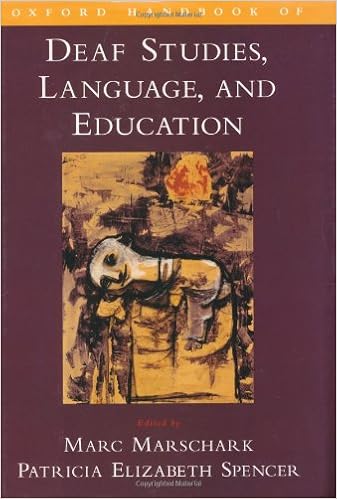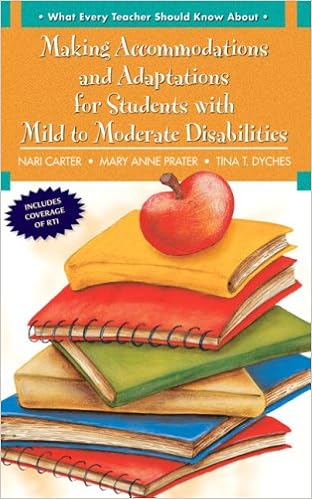
In Bilingualism and Bilingual Deaf Education, quantity editors Marc Marschark, Gladys Tang, and Harry Knoors compile different concerns and facts in comparable domain names: bilingualism between deaf beginners - in signal language and the written/spoken vernacular - and bilingual deaf schooling. the quantity examines each one factor in regards to language acquisition, language functioning, social-emotional functioning, and educational results. It considers bilingualism and bilingual deaf schooling in the contexts of mainstream schooling of deaf and hard-of-hearing scholars in general colleges, placement in targeted faculties and courses for the deaf, and co-enrollment courses, that are designed to offer deaf scholars the simplest of either academic worlds.
The quantity bargains either literature stories and new findings throughout disciplines from neuropsychology to baby improvement and from linguistics to cognitive psychology. With a spotlight on evidence-based perform, participants give some thought to contemporary investigations into bilingualism and bilingual programming in several academic contexts and in numerous international locations which can have various versions of utilizing spoken and signed languages in addition to diverse cultural expectancies. The 18 chapters determine shared understandings of what are intended by way of "bilingualism," "bilingual education," and "co-enrollment programming," research their foundations and results, and chart instructions for destiny study during this multidisciplinary zone. Chapters are divided into 3 sections: Linguistic, Cognitive, and Social Foundations; schooling and Bilingual schooling; and Co-Enrollment Settings. Chapters in every one part pay specific consciousness to causal and final result elements concerning the purchase and use of those languages through deaf freshmen of alternative a long time. The impression of bilingualism and bilingual deaf schooling in those domain names is taken into account via quantitative and qualitative investigations, bringing into concentration not just universal academic, mental, and linguistic variables, but additionally expectancies and reactions of the stakeholders in bilingual programming: mom and dad, lecturers, colleges, and the deaf and listening to scholars themselves.
Read Online or Download Bilingualism and Bilingual Deaf Education (Perspectives on Deafness) PDF
Similar Special Education books
Schools & Persistent Absentees
Drawing on an in depth examine of power absentees, their households and their faculties, David Galloway explores the superiority of absence from faculties and the underlying factors. He indicates majority of negative attendees stay at domestic with their mom and dad' wisdom, and sometimes with their consent, and argues that the deprived situations of the various households involved is of little relevance to academics until in addition they realize how the scholars and their households view what the college has to supply.
Exceptional Music Pedagogy for Children with Exceptionalities: International Perspectives
Unheard of track Pedagogy for kids with Exceptionalities bargains readers in song schooling, track treatment, and tune in detailed schooling groups a brand new, very important, and globally-informed source for potent track pedagogies. quantity editors Deborah VanderLinde Blair and Kimberly McCord have assembled the following a various and overseas set of academics and researchers.
Oxford Handbook of Deaf Studies, Language, and Education (Psychology)
In Plato's cratylus, which dates to 360 B. C. , Socrates alludes to using indicators by way of deaf humans. In his normal background, accomplished in seventy nine A. D. , Pliny the Elder alludes to Quintus Pedius, the deaf son of a Roman consul, who needed to search permission from Caesar Augustus to pursue his education as an artist.
This useful source and reference provides short, hands-on, research-based tools for facilitating entry to the overall schooling curriculum for students with specific studying and behavioral needs. This booklet is designed to educate preservice academics approximately demanding situations scholars with mild/moderate disabilities face in studying lecture room curriculum, and to help these teachers learn tips to offer lodgings and diversifications that handle scholars’ academic wishes.
Additional resources for Bilingualism and Bilingual Deaf Education (Perspectives on Deafness)



